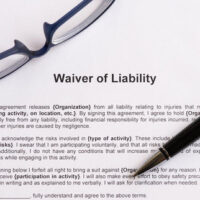Using a Waiver to Protect Your Business from COVID-19 Liability Risks? Read These 7 Tips

As Florida’s businesses continue to reopen after the state’s stay-at-home order expired on April 30, 2020, many companies are concerned about the risk of being sued after reopening. Requiring visitors to sign a liability waiver may be an efficient way to mitigate liability risks.
However, when using waivers to protect yourself from COVID-19-related business litigation, there are quite a few things to consider.
7 Things to Consider When Using a Liability Waiver in the COVID-19 Era
You need to consider the following seven things prior to requiring your customers and visitors to sign a liability waiver amid the coronavirus pandemic.
- Let Your Customers Know What Rights Are Being Waived
When using a waiver to protect your business from COVID-19 liability risks, make sure that the signor (your customer or visitor) understands that he or she is waiving certain rights. If the document is lengthy and the waiver is somewhere at the bottom, use bold font for the waiver or warn the signor that the document includes a liability waiver.
- Provide Valid Consideration
To ensure that your liability waiver is enforceable and legally binding, you need to provide valid consideration. Thus, the signor must understand that by not signing the waiver, they may be denied access to the premises or may not be able to use your company’s services or buy your products.
- Your Waiver May Not Apply to Minors
If you run a business whose target audience is minor children or minors often enter your business, your waiver may not be legally binding. However, that depends on your state laws. In some states, waivers signed by parents are unenforceable. Under Florida Statute 744.301(3), parents can sign liability waivers on behalf of their minor children.
- Posting a Waiver May Not Be Effective or Enforceable
While some businesses choose to post liability waivers in a prominent location on the premises, doing so may not be effective or enforceable. To make sure that a waiver is legally binding to protect your business from COVID-19 liability risks, it needs to be provided to and signed by the customer.
- Consider the Duress or the Lack of Time Factors
As most businesses will provide liability waivers prior to allowing customers to enter their premises, there are a few considerations when it comes to signing at the door. You need to make sure that the signor can take their time to comfortably sign the waiver to avoid arguments related to duress and the lack of time, which could invalidate your waiver.
- Do Not Overstate or Exaggerate Your Anti-Coronavirus Measures
Be careful about statements regarding the measures adopted by your business to minimize the risk of exposure to COVID-19 on the premises. After all, the law does not require waivers to contain statements about specific steps taken by a business to reduce exposure to coronavirus.
- Your Waiver May Not Prevent Lawsuits
Even the most enforceable and legally binding waiver cannot protect a business from a lawsuit. Rather, waivers are used to defeat any claims against the business by arguing that the plaintiff was aware of the risks when he or she signed the waiver. The mere existence of a waiver does not bar a customer from filing a lawsuit.
While businesses are pushing for civil immunity from coronavirus-related lawsuits, you need to consult with a West Palm Beach business litigation attorney if you are considering using a liability waiver to protect your company from legal risks. Contact Pike & Lustig, LLP, to discuss your situation. Call at 561-291-8298 today.
https://www.turnpikelaw.com/covid-19-6-liability-risks-a-business-is-facing-after-reopening/
